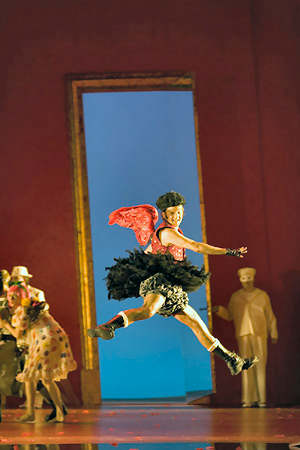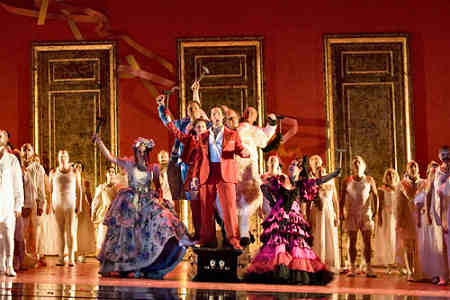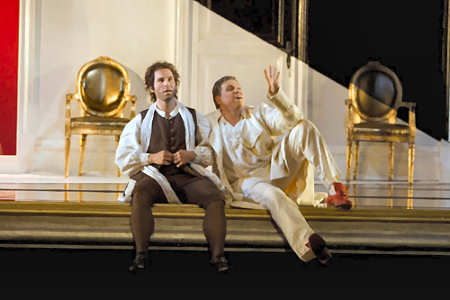Carl Nielsen:
Maskarade – Soloists, Orchestra and Chorus of the Royal Opera
/ Michael Schønwandt, conductor; Royal Opera House, Covent Garden, 19 September, 2005 (ED)
Jeronimus: Brindley
Sherratt
Magdelone: Kari
Hamnøy
Leander: Michael
Schade
Henrik: Kyle
Ketelsen
Arv: Adrian Thompson
Leonard: Robin Leggate
Leonora: Emma Bell
Pernille: Gail
Pearson
Nightwatchman, Constable, Mask-Seller,
Professor, Flower-Seller, Magister,
Doctor Mors, Master of Ceremonies: Martin
Winkler
Director:
David Pountney
Set Designs: Johan
Engels
Costume Designs: Marie-Jeanne
Lecca
Lighting: Wolfgang
Göbbel
Choreography: Renato Zanella
Sung
in English (trans. David Pountney) with English
surtitles.

How nice, one might think, to go to the opera and
not be forced to think too hard.
Nielsen’s Maskarade
might be taken as defining the boundary between opera and operetta
in the early years of the twentieth century. The music is upbeat
from the start, and wholly accessible to the most inexperienced
of opera-goers. In fact, on the surface of things the only people
likely to be disappointed are those used to the more intense
sound world of Nielsen’s symphonies. In Denmark, of course,
it is accorded classic status – so maybe it’s about time it
reached a wider public.
David
Poutney’s production takes its cue
from the music and presents an action packed evening that exploits
the comic possibilities the scenario affords. The scene opens
with Leander and his servant Henrik recalling the delights of the previous evening’s masquerade,
and the mysterious girls they met – which brings on their desire
to go again that evening in the hope of seeing them again. Comic
interludes are given by Magdelone,
Leander’s mother – herself something of a masquerade habitué
in years past, and the interplay between Leander’s father, Jeronimus,
his servant Arv – entrusted with the task of ensuring Leander does not
attend that evening’s revelry, and Leonard – the father of Leander’s
intended, Leonora. This
much occupies the first two acts, with the third being devoted
to the much anticipated masquerade itself.

The
main problem with the work is that it owes too much to too many
and lacks identifiable originality. The plot carries half-shades
of Mozart’s Le Nozze di Figaro about it in the master - servant layering, whilst
the music steers a course between Lehar
and Offenbach (the latter particularly in the third act, where
dance forms dominate). Only in the delicate nocturnal opening
of Act II is there anything remotely akin to Nielsen’s orchestral
writing – and this was indeed atmospherically played. I left
feeling as if I’d just sat through a meal consisting almost
entirely of deserts. If only there were other passages to give
contrast to the all-pervasive fun, the cumulative sweetness
would have been dissipated somewhat.
I
can envisage a production almost the exact opposite of Poutney’s
being effective, set in a quiet white-walled Danish room, leaving
the music to carry the frivolity alone. The musical contrast,
left unremarked upon, could thereby heighten the work’s serious
underlying message regarding commitment vs. frivolity as forces
upon youthful love regardless of social station. But this goes
for nothing here, and in choosing the frivolous approach though
and through at least Poutney et al
let it run unremittingly in a style that is not beyond taking
the rise out of itself.

But
is it entirely successful? Not really. My reservations are not
with the production in terms of its overstated staging, or Marie-Jaenne
Lecca’s bold and brash costuming.
Rather, they are with certain performances, and specifically
with Poutney’s all too predictable
rhyming translation. Performance-wise Kyle Ketelsen was most impressive, his insightful baritone finding
its way with ease around the text. Likewise, Robin Leggate’s
character tenor as Leonard made the most of his allotted part.
Emma Bell, in her Royal Opera debut, was the most obviously
operatic assumption of the evening – demonstrating that great
things are indeed on the cusp of realization for her. She easily
outclassed Michael Schade, both in
terms of tone and diction – it was clearly not his night, rather
unfortunately as this left their duets rather one-sided. Gail
Pearson’s Pernille provided a well characterised contrast to Leonora
in Act III, and well acted too, which should be said for all
concerned. Overall though it must be said no single role is
long enough to make a strong mark and allow character development:
what you see is what you get.
Michael Schønwandt conducts it all with knowing fluidity and keeps
the pace moving, at the start perhaps almost too much so. He
clearly delights in the orchestration of the masquerade’s variety
of dances, though sometimes cannot hide langeurs
in Nielsen’s writing. Throughout there was a natural responsiveness
between the orchestra and the stage, that demonstrated perhaps
that Nielsen’s dramatic sense might have developed had he written
further stage works. That
said, the score proved illustrative in snatches that periodically
underlined the stage action.
Enjoy
it if you can – just don’t expect a single ounce of profundity.
A fundamental change in the writing, and a few production alterations
would have proved beneficial for me, but that’s as may be.
And if you’re left wondering as to how the lovers’ plight
of impulsive infatuation set against paternal expectations resolves
itself… let me say only that it ends well for all concerned.
Evan
Dickerson
MASKARADE
Royal Opera
RICHARD GAUNTLETT AS CUPID
MICHAEL SCHADE AS LEANDER & KYLE KETELSEN AS
HENRIK
PHOTOG © BILL COOPER – SEPTEMBER 2005





